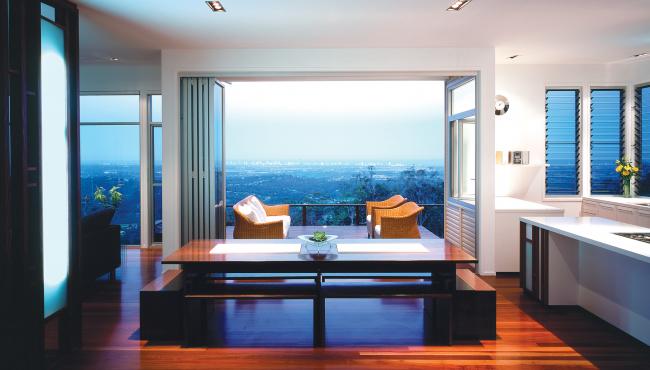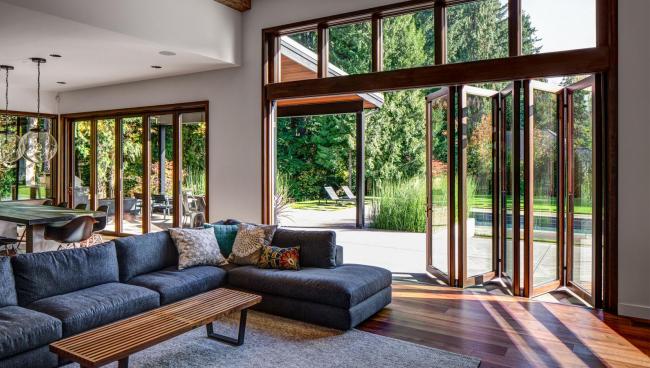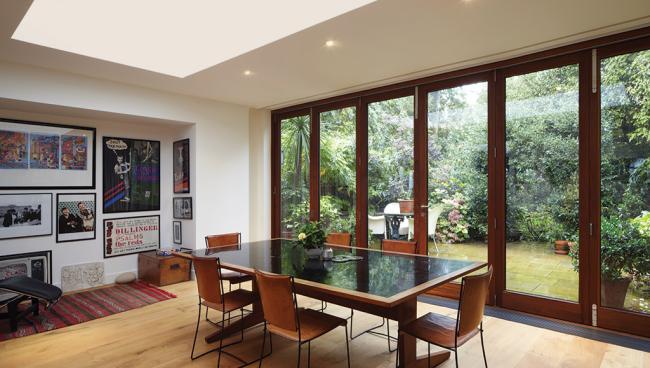
While folding doors remain a popular design feature in the United Kingdom, they are a relatively new concept throughout much of Europe. The appeal is the way they open homes to the outdoors and bring light and air inside. But when it comes to selecting specific systems or a manufacturer, it really pays to take the long-term view.
Due to their size, number of panels and higher performance requirements, folding doors generally cost more than sliding or French doors. To ensure your investment doesn’t become a liability, it’s important to choose a system that offers reliability and ongoing enjoyment. t\The Centor team have put together some key points to consider when choosing a folding door for your home.
Consider thermal values: This is an area where building regulations are becoming ever more demanding, and likely to continue to do so. Carbon neutral homes recommend a U-value of 0.8, so the closer you can get to that rating, the more future-proof your home will be.
Buying advice: Look at the thermal value of the folding doors you are considering. A U-value, at or better than, 1.5 is a reasonable standard.
Consider reliable operation: Folding doors are more complex than either sliding doors or French doors. Therefore, the opportunity for malfunction is greater. If your doors don’t operate reliably in years ahead, they will become a liability rather than an investment.
Buying advice: Take time to visit a showroom or exhibition and operate the doors yourself – if they don’t operate smoothly and quietly, then it’s likely you’ll have issues with them in future years. Ask for evidence of cycle testing too.
Consider strength: Folding doors often span greater areas than French or sliding doors and, like a sail, the force placed on them by weather conditions gets proportionally greater the larger the area. If your home is in an exposed position, such as the coast, this issue becomes more critical. Poor strength can lead to issues of draughts and water leakage in severe weather.
Buying advice: Ask for evidence of pressure testing – 1200pa constant/1800pa gusting pressure is a good standard for most locations. If your home is in an exposed location, local requirements may mandate high ratings.
Consider vertical and lateral adjustment: Folding doors are manufactured with great precision. However, the opening in your wall may not be absolutely square or could be affected by building settlement, land heave or subsidence. Therefore, folding door systems that aren’t square in the opening may not operate or seal properly.
Buying advice: Look for systems which are both vertically and, most importantly, laterally adjustable. This adjustability will make it much easier for your installer to fit your folding doors accurately and, if there is movement over time, the system can be simply re-adjusted without disturbing the frame meaning your doors will continue to operate smoothly.
Consider rattling doors or poor sealing: The multiple panels of folding doors can mean this is a potential issue. Doors that rattle in the wind aren’t just irritating but can also cause hardware to loosen and eventually not work properly. Poor sealing will cause whistling noises and give poor acoustic performance.
Buying advice: Test the doors for rigidity and stability. Look for multiple seals, which include foam seals for improved acoustic performance.
Running through these simple checks will give you confidence you are selecting the best value folding door that will continue to add value to your home for years to come.
To ensure your investment doesn’t become a liability, it’s important to choose a system that offers years of reliability and ongoing enjoyment.


